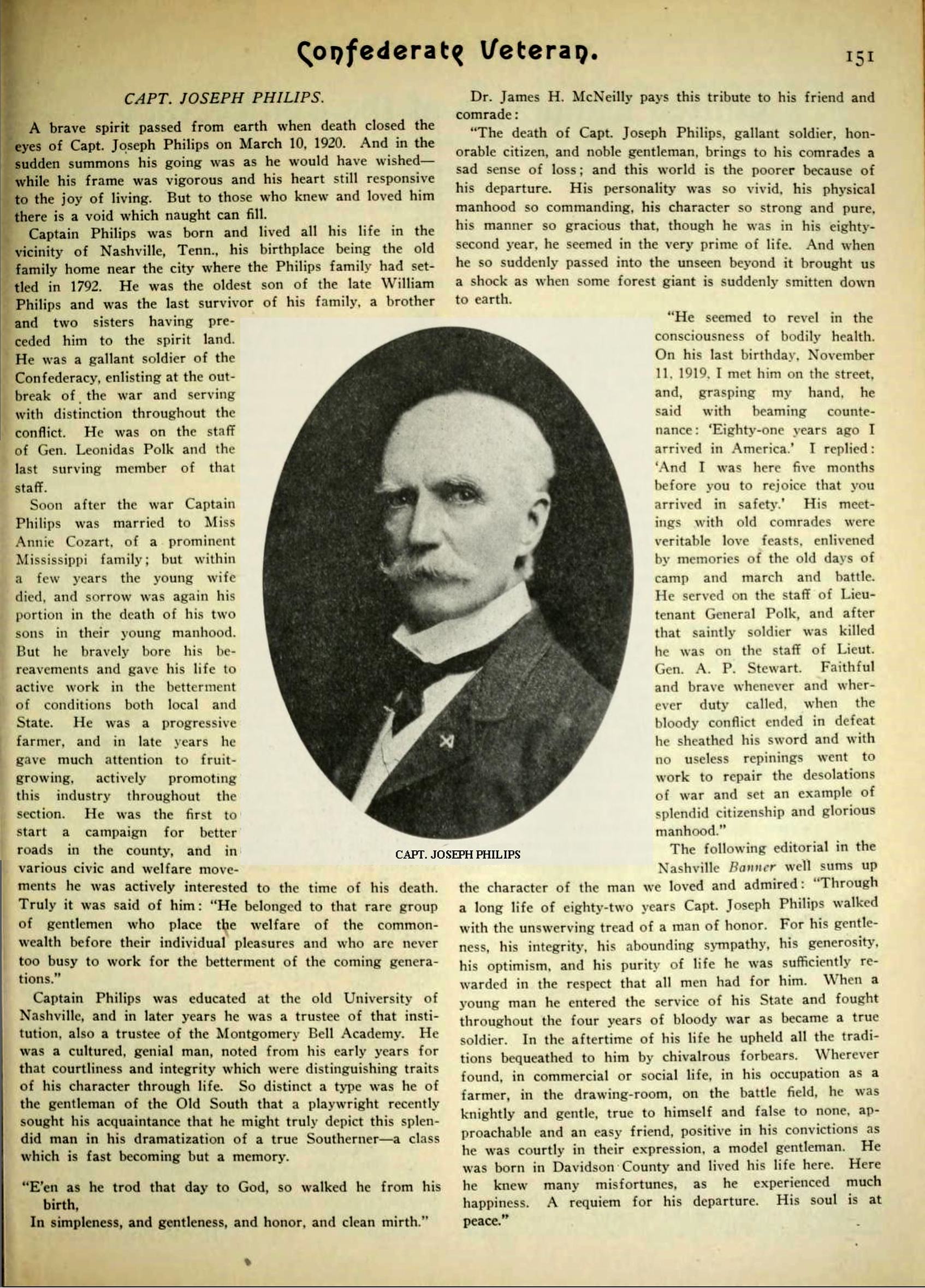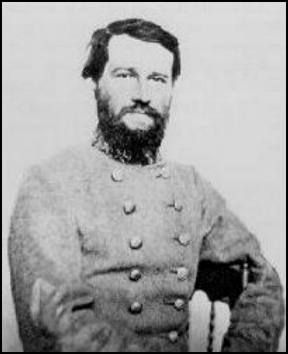|
|

|
CAPT. JOSEPH PHILIPS was born on 11 Nov 1838 in Davidson Co TN. He died
on Mar 1920 in Davidson Co TN. He married ANNE COZART on 13 Jul 1864, daughter of William Mangum
and Sarah Murray. She was born in Columbus, MS. She died in 1882. They are both buried in
the Mt. Olivet Cemetery in Nashville TN.
|

A History of Tennessee and Tennesseans by William T. Hale, published 1913, Volume
VII
CAPTAIN JOSEPH PHILIPS. An able and much respected representative of the agricultural and horticultural interests of
Davidson county, Captain Joseph Philips is the owner of a good farm lying on Brick Church pike, not many miles from Nashville.
He was born November 11, 1838, on this same farm, and here also occurred the birth of his father, William Duncan Philips,
on June 10, 1804, thirteen years after the land had been secured from the Government by Joseph Philips, the Captain’s
grandfather. He is of Welsh ancestry,, his paternal great-great-grandfather, Joseph Philips, having emigrated from Wales
to this country in colonial days, settling in North Carolina, where he purchased a tract of land that had been granted
by the Crown to Earl Grey, his name having been spelled “Phillips.”
The above paragraph contains several errors of fact: First, Joseph Philps purchased the land and did not obtain it from the government. Second, his
great-great-grandfather was named John Philips (spelled with one "L" who lived in Surry County VA . It was his great-grandfather
Joseph Philips who moved from VA to NC about 1750 with his siblings after his father John died in VA.

The below story appeared in the April 1920 Confederate Veteran's Magazine.


|
Obtaining his elementary education
in the rural schools, Joseph Philips completed his early studies at the University of Nashville. At the breaking out of the war between the states he enlisted in the Tenth Tennessee Volunteer Infantry,
known as the “Irish Regiment,” and was commissioned lieutenant of his company. At the end of four months he joined Bankhead
‘s First Battery as its lieutenant, and being assigned to
the staff of General Leonidas Polk (picture at the right), was one of its lieutenants
when the general met his death at Pine Mountain in North Georgia. General Leonidas Polk is the brother of Rufus K. Polk who married Joseph
Philips' sister Margaret. Both were brothers of James Hilliard Polk who married
Mary "Mollie" Demoville Harding, Joseph Philips' niece, the daughter of his sister Milbrey Catherine Philips.
|

General Leonidas Polk was born in Raleigh, North Carolina
on April 10, 1806. Leonidas Polk attended the U.S. Military Academy at West Point and graduated in 1827. Soon after he dropped
out of the Army and joined the Episcopal Church. He became Bishop of Louisiana in 1841. His friend from West Point, Jefferson
Davis, convinced Polk to join the Confederate Army in 1861. Polk was commissioned a Major General and was put in charge of
securing the Mississippi River. While in Kentucky he moved his command around as his enemies required, he even ferried across
the river to help repel Grant's move on Belmont, Missouri. General Polk had to pull out of Missouri when the Federals took
over Number 10 and New Madrid, he would then take command of a Corps under General Albert Sidney Johnston. He fought
during the Battles of Shiloh and Corinth, he was then promoted to command of the Army of Mississippi. Polk would lead the
Army of Mississippi at Perryville, then General Polk led a Corps in 1863 at the Battles of Murfreesboro, the Tullahoma Campaign,
and Chickamauga. General Polk was transferred to the quiet portions of Mississippi in late 1863. When the Union began to pressure
Mississippi, Polk's small force, of only one Corps, was called up. Polk and his forces were moved to Georgia to help protect
Atlanta. On June 14, 1864, while in a conference with Generals Joe Johnston and William Hardee, Polk was killed by a
cannon ball.
|
|
Subsequently a
member of the staff of General Stephen D. Lee (picture at right), Captain Philips was in active service in the C.
S. army from the beginning until the close of the war, taking part in many battles of
note, among which were the engagements at Perryville, Kentucky; at Shioh; in the battles
with Sherman’s Army through North Georgia to Atlanta; and in the siege of that
city. He was captured by General Wilson’s forces at Selma, Alabama,
and while a prisoner-of-war was a guest at General Wilson’s headquarters. On May 15, 1865,
Captain Philips was paroled at Columbus, Mississippi, and immediately returned home.
He inherited, on the death of his parents, a part of the old homestead. In addition
to carrying on general farming, the Captain has made a specialty of horticulture.
|

Steven Dill Lee was a Civil War Confederate Lieutenant General, educator. He was
born in Virginia and attended the Military Academy at West Point. He served on the frontier and in the Seminole War before
resigning in February 1861 to join the Confederacy. He rose to the rank of Brigadier General and was sent to Vicksburg where
he was captured. He was exchanged and promoted to Major General and placed in command of a cavalry division. Later promoted
to Lieutenant General, he assumed command of Hood's Corp when Hood was placed in command of the Army of the Tennessee. After
the war he served as the first president of Mississippi A&M College, now known as Mississippi State University, from
1879 to 1899. After he retired, he remained active in Veteran's Affairs until his death.
|


Captain Philips married July 13, 1864, Miss Annie Cozart,
who was born in Columbus, Mississippi, a daughter of William Mangum and Sarah (Murray) Cozart, natives, respectively, of North
Carolina and Georgia. Captain and Mrs. Philips reared two sons, William Cozart
and Joseph, both of whom died unmarried. Politically Captain Philips is a straightforward
Democrat. He is a member of one of the American college fraternities, the Delta
Kappa Epsilon, and belongs to the John C. Brown Bivouac, Confederate Veterans.
The below copy of Capt. Joseph Philip's will came from the Tennessee State Library and Archives.

Below is a snippet from the book "Nashville in the 1890's" recounting the role
that this Captain Joseph Philips played in founding the Nashville Trust Company and his service as a director of that Bank.
It also give some information on the Demoville family is related to the Philips family.
Nashville in the 1890s by Larry Feldhaus
|

